- Home
- Jean R. Ewing
Love's Reward Page 11
Love's Reward Read online
Page 11
“Nonsense,” Fitzroy replied. “After coming so far and getting wet, the least we can do is have a little fun, don’t you think?”
He helped Joanna from the carriage and into the shelter of the porch, where Simon began a ponderous hammering at the door. There was no reply.
“Keep trying,” Fitzroy said.
Several more heavy blows followed.
Joanna stood in the porch, while her husband stepped back out into the rain and gazed up at the face of the building.
It began to pour in earnest. The horses shifted nervously in the hand of the tiger. Fitzroy spoke to them, soothing and quiet, water running down over his face and soaking his coat.
“Whatever is the alarm?” a shrill female voice cried suddenly. “I warn you, if you are brigands, we are armed.”
“Brigands in England, Miss Able?” Fitzroy queried, calm and polite. “Lord Tarrant, at your service, ma’am, most certainly not a brigand. You will not, I pray, fire that fearsome blunderbuss? I have come to visit my new wife’s sister, Lady Matilda Acton.”
A lamp sprang to life in an upstairs window. Yellow light washed over Fitzroy’s face, casting his features in gilt.
“At this hour! All decent God-fearing folk are in their beds, Viscount Tarrant. This is a ladies’ establishment, where decorum and propriety are our watchwords and our guides. You would not gain entrance now, were you good King George himself.”
“I trust I am more in command of my faculties than our sainted monarch, ma’am. I pray you will open this door before my servant takes it into his skull to break it down.”
Miss Able shrieked. “I’ll have the Watch on you and your men, you rogue!”
“No, no,” Fitzroy called. “Not the blunderbuss, I pray you, ma’am!”
Joanna stepped out and peered up at her erstwhile headmistress.
“I am here, too, Miss Able, and getting uncomfortably wet. Pray, let us in! Having come so far, may I not see Milly now?”
“Oh, goodness! This is beyond the bounds of anything. I am surprised you dare show your face on these premises, young lady.”
Fitzroy choked back a grin and tried to look stern.
“You are speaking, Miss Able, to my wife, Lady Tarrant, future Countess of Evenham. I’m sure she will forgive your nightcap and gown, and even your fearsome weapon, but she can hardly overlook being made to stand in the rain.”
Miss Able clutched at her nightcap, askew on the straggles of hair that snaked beneath it.
Throughout the exchange, Simon had continued to hammer lustily at the door.
One by one, other lights appeared in other windows, followed by a succession of young female faces pressed against the glass. Eventually a window at the end of the row on the second floor opened to reveal a bright blond head.
“Joanna? Oh, how splendid!”
Joanna spun about and ran along the front of the house until she was directly beneath the window.
“Milly! Are you all right?”
Lady Matilda Acton leaned further from the window. “Of course, I’m all right! Why wouldn’t I be? What on earth are you doing here?”
“Why do we not discuss that in more comfort?” Fitzroy suggested, taking off his hat and pouring water off of it. “Miss Able?”
Mistress and blunderbuss both disappeared from the window.
A few moments later the front door swung open. Fitzroy and Joanna were allowed to step into the hallowed hallway of Miss Able’s Academy for Young Ladies, while Milly was fetched from her bedroom.
Miss Able herself soon appeared again, hastily dressed in her best bombazine, with her wig on crooked. Joanna was about to be treated to the extraordinary sight of her husband charming this fearsome apparition into smiles and giggles.
While Fitzroy diverted Miss Able, Joanna hugged Milly and pulled her little sister aside. They sat together on the hard horsehair sofa.
“Why have you come?” Milly asked. “And in the middle of the night.”
“I received a silly message,” Joanna replied. Now, in this ugly, too familiar parlor, her fears seemed absurd. “Has no one been near you?”
“Why should they? I wish they had. It’s terribly dull here without you.”
Joanna took the strand of golden hair that she had carried from London and laid it against Milly’s plaits. The shade was quite different. She hugged her sister again.
“Then I have just made a dreadful fool of myself.”
“But I had a message, too,” Milly said. “I remember it exactly, though I threw it away. No es oro todo lo quo reluce. It’s just nonsense, isn’t it?”
Fitzroy spun away from Miss Able.
“So, you see, it was a jest, after all,” he said sharply. “Shall we let Miss Able and her pupils return to their beds?”
Joanna looked up at him in alarm. The good humor was gone. His brow had contracted into a dark frown.
“I’m sorry—” she began.
Any malevolence seemed dissolved into pain.
“Oh, for God’s sake, don’t apologize! Surely your splendid state of wetness is penalty enough?” He strode to the door. “Let’s go!”
* * *
Fitzroy drove back to London through the downpour in an agonized silence.
He did not dare look at Joanna sitting stiffly at his side, in case he should spill out the horror that lay in his heart. He could never burden her with it.
No es oro todo lo quo reluce.
All is not gold that glistens.
Joanna could not have known, but it had been one of Juanita’s favorite sayings.
Would messages like this keep arriving forever? With most of them jokes, and some of them lethal?
When they arrived back at his house, Joanna fled up the stairs to her room, leaving Fitzroy alone with his servants.
“Begging your pardon, my lord,” Simon said. “How did you know for sure, before we spoke with Vernon, that the little girl was truly safe?”
“I didn’t, though it seemed likely.”
“But you were so very jolly with the mistress—”
Fitzroy turned to him, fiercely rubbing a hand over his wet hair.
“And why not? Why the devil let her suffer her fears for the whole journey?”
* * *
When Joanna came down in the morning he had already left the house.
She packed up a portable easel, with some sketch paper and charcoal, and ordered a carriage to take her to Lady Mary.
Fortunately the Black Earl was out. Joanna did not want to meet Lord Evenham just now. His eldest son seemed too much like him.
Lady Mary lay on a chaise longue in a sunny drawing room leafing through a book. She looked up with real pleasure when Joanna came in.
“Oh, are you here to begin my portrait? It’s so very agreeable of you.”
“Not at all, it’s a real pleasure.”
Joanna meant it. She stood at her easel and began her preliminary study of Lady Mary’s features with the easy confidence she had always brought to her work in the past, except when the subject was Fitzroy. There was a distinct family likeness between them, clear in the dark hair and excellent bones, in the unmistakable intelligence.
Yet, just like her brother, a shadow marked Lady Mary’s expression. Joanna decided she must remove it, if her painting was to be a success. Lady Mary needed to relax and forget her troubles.
“Do you like verses?” Joanna asked.
“Verses?” Lady Mary looked around in astonishment. “Oh, I’m sorry. I’ve moved, haven’t I?”
“It doesn’t matter. Are you tired? Perhaps we should take a break.”
“I’ve ordered us a little informal luncheon. Shall we have it now?”
Joanna smiled and nodded as she set down her charcoal.
Lady Mary stood and rang the bell, then came over to see what Joanna had done.
“Good heavens,” she said. “You really are an artist. That’s wonderful.” She smiled. “But I think you flatter me. Do I really have such a strong rese
mblance to my handsome brother?”
“You’re angling for compliments, Lady Mary,” Joanna replied instantly. “He’s lucky if he can boast a likeness to you.”
A servant came in to lay a light meal onto a small table: fresh crusty rolls and butter; fruit cut into elegant little pieces; a wedge of creamy white cheese.
“Please, help yourself,” Lady Mary said, as she took her seat at the table. “Why did you ask about verses?”
Joanna sat opposite Fitzroy’s sister and took some bread and cheese.
“When we were children, my brothers and sisters and I used to play a game with our grandmother. Someone would begin a nonsense rhyme, and everyone had to supply a line in turn. It was tremendous fun. I thought we might do the same while I work to help pass the time.”
“But I couldn’t possibly!” Lady Mary exclaimed. “How on earth could you invent a rhyme, just like that?”
“Easily! It didn’t have to be very good, you know, just funny. The last time we were all together at Acton Mead—that was my grandmother’s home, but it’s Richard’s now—we did one about my little sister Milly. John and Eleanor started like this: ‘There once was a creature called Milly, who went out whene’er it was chilly.’ Then Richard added, ‘But although we had snow, the sled wouldn’t go—’”
“Oh, good heavens! And someone had to provide the last line? What was it? I’m intimidated already.”
Something moved behind them. Joanna glanced around and felt her heart constrict. Fitzroy stood in the doorway, watching her. She couldn’t understand the expression in his dark eyes, so she looked away, chin high, as he came into the room, his boots soft on the thick carpet.
“Intimidated, Mary mine?” Fitzroy leaned over his sister and kissed her. “Never say an Evenham can’t match an Acton, when it comes to absurdity! How about: ‘It was caught on a daffydowndilly.’”
Mary looked up at him and laughed. “A daffodil strong enough to stop a sled? But that’s nonsense.”
Fitzroy pulled a spare chair up to the table and sat down. The shadow was completely masked. He seemed determined to be civil, even generous, but Joanna felt wary. She had allowed herself to be too vulnerable, and received nothing but disdain in exchange.
Yet he had not hesitated to drive her to Miss Able’s, and she owed him something for that.
“Which I understood to be the idea. But neither is it good enough yet for Joanna?” Fitzroy winked at her. “Then how about . . . ‘for the chilly filly, Milly, willy-nilly.’”
In spite of herself, Joanna laughed. “Not obscure enough! Mine would have been, ‘Since Harry won’t push it, now, will ‘e?’ But before I could say that, Harry himself came in and tossed off an ending as neat as you please. ‘Since she couldn’t tell flat land from hilly!’ And no one could top that, now, could they?”
Lady Mary clapped her hands together. “Because Milly forgot how to, poor silly.” Then she blushed, though she was still grinning. “How about one about Joanna?”
Fitzroy began immediately. “Who can describe Lady Joanna? / As she dines upon white bread and manna—”
“Oh, there are no rhymes left at all,” Lady Mary said.
“She’ll force down the mess, / In the cruel wilderness,” Joanna added.
Fitzroy didn’t hesitate. “Joanna’s eaten manna, hosanna!”
Joanna’s voice clashed with his. “Eat manna, I declare, but I canna!”
Within five minutes the table was in an uproar of laughter.
Caught up in the merriment, Joanna fought to top her husband in flights of wordplay, punning and rhyming, trying to cap every absurdity with a fresh one.
It felt strangely innocent and natural, to play and have fun as if only the moment mattered. This was a side of him she had never imagined, let alone witnessed. A man who could set aside everything else to be merry with his sister.
“Enough,” Fitzroy said at last. “Alas, I must go.”
He stood and kissed Lady Mary once on the forehead before striding to the door. Then he turned and winked at Joanna.
Still bright with hilarity, Joanna looked at him poised in the doorway, one hand on the jamb, the other pressed flat over his heart.
This is how he should be—laughing, free! The tousled dark hair, the span and vigor and power of every line of him, truly carefree and relaxed for the first time. The longing to capture it in paint caught at her heart. This is how Mary must remember him.
Yet that hint of distress darkened his expression immediately, blurring the purity of the moment, flooding her with frustration. She was being closed out again.
“Until tonight, Joanna,” he said, the merriment dying out of his voice.
Joanna felt her question stick in her throat. “Tonight?”
“When I shall pose for you.”
“Oh, of course.”
He dropped his hand as if it hurt him, the fingers clenching unconsciously into a fist.
“Tomorrow is Lady Reed’s ball. As newlyweds we must put in an appearance. Our fathers require it, so that we may face down any last shreds of gossip.”
“Yes,” she said faintly. “Of course.”
He tossed his last comment over his shoulder as he strode away. The innocent children’s rhyme seemed bruised with anger.
“‘Who’ll sing a psalm?’ ‘I,’ said the Thrush, as she sat on a bush, ‘I’ll sing a psalm.’”
* * *
The dressmaker arrived that afternoon. Joanna began to order the wardrobe she would need if she was to make an unexceptionable Lady Tarrant and fulfill her new role in society as a married lady.
While the woman fussed and measured and held up swatches of fabric, Joanna thought hard about Fitzroy.
What on earth had he done that Richard found so unforgivable? What haunted and drove him so mercilessly? Why did he no longer paint when he had such brilliant talent of his own?
“Mrs. Price,” she said at last. “Do you know that old nursery song about Cock Robin?”
The woman’s pale eyes looked up at her client in surprise. She pulled a couple of pins from her mouth.
“Why, of course, my lady! The bullfinch has my favorite verse: ‘Who’ll toll the bell?’ ‘I,’ said the Bull, ‘because I can pull. So Cock Robin, farewell!’ Why, I’ve sung it to my children often enough, bless me!”
Mrs. Price was a warm, motherly person. It wasn’t hard to imagine her singing rhymes to her babies, as Helena no doubt sang to little Elaine. The memory of her niece’s sleeping face brought a sharp, unexpected stab of pain.
Joanna crushed it and made herself think about the problem at hand.
“Yes, we used to sing it when we were little, too, with my grandmother. My youngest sister, Milly, would cry over it. What do you suppose it means?”
“Why, nothing, my lady. All a lot of nonsense, isn’t it? Birds and beasts talking and murdering, and giving each other Christian burial? Just doggerel for children, that’s all.”
“Is it?” Joanna asked.
She could still hear Fitzroy’s mocking voice. You are the pagan, after all.
Would she be able to draw him tonight, or was she doomed to be blind where her strange new husband was concerned? Surely she could not fail Lady Mary in this?
“Do you prefer the ivory trimming or the rose, my lady?” the dressmaker asked. “The ivory compliments your complexion very well, but the rose brings out more color, I believe.”
Joanna shrugged and tried to concentrate on the dresses.
Although she and Fitzroy were not to share their lives, she was to accompany him to Lady Reed’s ball the next day. There wasn’t time for Mrs. Price to make her a new dress for that, so she would have to wear an old one.
Yet for no reason she could fathom she wanted to impress him.
* * *
Fitzroy came to her studio very late, with the gloss of fatigue and distress plain on his features.
Once again he sat in the chair, and Joanna stood at her easel.
Very slowly and carefull
y she began to draw him. There was a slight irregularity to the shape of his nose that she hadn’t noticed before, and the hint of a dimple marked the corner of his mouth—or did he have a very small mole there, hiding in the shadow?
She let her charcoal float over the paper, as if the stick were actually touching him with a light, soft caress.
The shapes molded and formed. The curve of his cheekbone, the deep curl of his lip, the entrancing outline of his ear with the black hair curling carelessly over it.
A deep, warm pleasure began to build in her, a soft, sweet flush creeping over her limbs to settle heavily in her belly.
Yet somewhere, on a deeper level, an unease crept in with it. Joanna was barely aware of her feelings. Lost in concentration, she forgot her fears.
Yes, tonight it was happening. She had not lost her skill.
At last she stepped back and looked critically at what she had done.
It was a good likeness, capturing not only his features, but also his mood and something of his dark power.
Yet it was not the memory of a beloved brother that anyone would want to take to Switzerland. Surely Lady Mary would prefer him carefree and untroubled, as he had seemed that morning? The portrait must capture Fitzroy Monteith Mountfitchet filled with gaiety and laughter.
She closed her eyes for a moment, seeing clearly how it must be: his intensity and intelligence affirmed and clarified by humor, not this grim, tight man harassed almost to despair by his mysterious duties.
Joanna stared at the drawing, trying to place what else made her so uncomfortable.
Every line spoke of that bone-deep fatigue and its shadow of distress, as if her charcoal had unwittingly trespassed too deeply, seen too much. The result was disconcertingly intimate and revealing—a blatant, dishonorable invasion of his privacy—exposing him, vulnerable, human, as if she had deliberately set out to uncover any personal weakness and shout it to the world.
Oh, Lord, in its way this was worse than her disaster of the night before!
Without thinking—the vision of what she wanted burning away any other consideration—Joanna left the easel and rushed up to him.
“This is no use. You’re too tired and preoccupied.”
She seized his arm and shook it. Fitzroy shrugged off her hand.

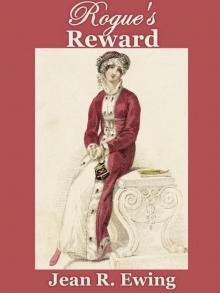 Rogue's Reward
Rogue's Reward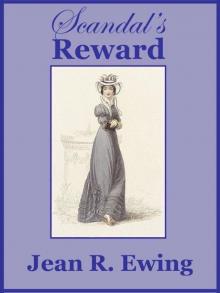 Scandal's Reward
Scandal's Reward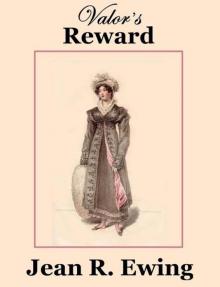 Valor's Reward
Valor's Reward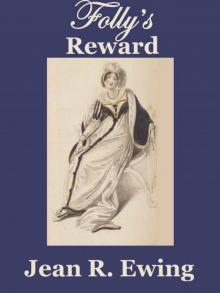 Folly's Reward
Folly's Reward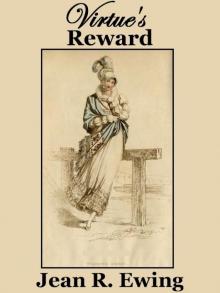 Virtue's Reward
Virtue's Reward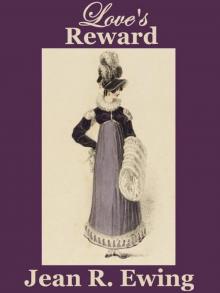 Love's Reward
Love's Reward